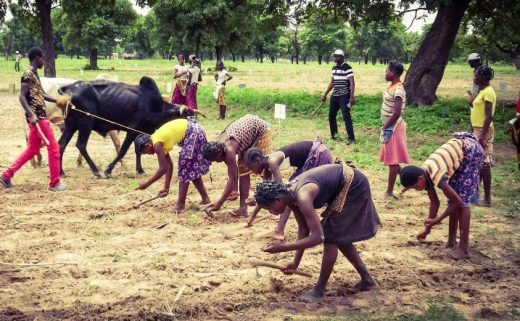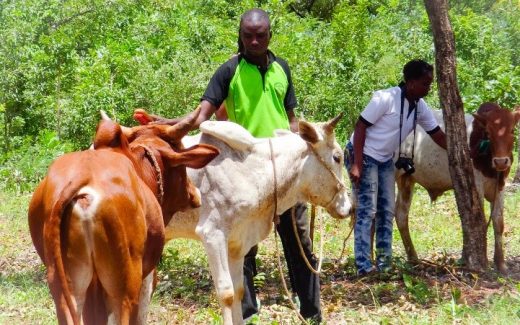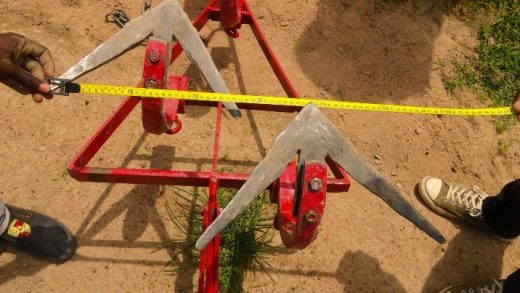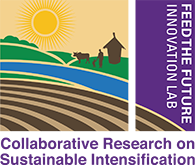The overarching goal of the Appropriate Scale Mechanization Hub in Burkina Faso is to assist the country’s smallholder farmers in improving their quality of life by integrating appropriate technologies into crop and livestock systems that sustain profitability and boost ecosystem resilience by alleviating labor bottlenecks while reducing the drudgery of labor-intensive farm tasks.
| Figure 1. Université Polytechnique de Bobo-Dioulasso students and ASMC interns Sayaogo Boureima, Victor Ye, Fatoumata Ganou and Dianda Saidou. |
We are near the end of the second year of the SIIL Appropriate Scale Mechanization Consortium (ASMC) project and are reviewing the initial objectives established in collaboration with the stakeholder group and advisory team to ensure that our activities are in line with project objectives. Stakeholders include the U.S. and Burkina Faso ASMC project teams along with local farmers, extension educators, students, agribusiness representatives, agricultural lenders, farmer organizations, technical service providers and others in the Hauts Bassins region.
The interaction with stakeholders was essential in defining the scope and structure of the work in Burkina Faso, and just as importantly, in illuminating a set of common goals and values shared by Burkinabé farmers. We asked:
- What is the local vision of small-scale farming systems that integrate all aspects of sustainability?
- Which aspects of the local farming systems are most important to retain if the overall objective is a sustainable balance of environmental, economic and social issues?
- What diminishes (physical, biological, cultural, etc.) the sustainability of local farming systems, and what can be done to overcome it?
- How can mechanization improve local farming systems that balance sustainability and social and gender equity?
The participatory and inclusive interaction with stakeholders provided an essential understanding of field conditions and helped prioritize the needs, challenges, and opportunities for mechanization. The resulting action plan continues to guide the project.
Farming Systems: Challenges and Opportunities
Burkinabé farmers face many challenges. Soils are degraded from cropping systems that fail to sustain natural soil fertility and productivity. Farmers lack easy access to improved and affordable seed and essential crop care inputs. Water is scarce, and rainfall is increasingly unpredictable. Agricultural mechanization research has been neglected for more than 20 years, so there is a lack of appropriate and affordable tools for animal traction and conservation agriculture. The highest priorities for mechanization innovation reported by our stakeholders were for 1) land preparation, 2) planting, 3) weed control, and 4) water use and conservation.
Mechanization in crop and livestock systems
The level of on-farm mechanization is low in Burkina Faso. (Animal Traction Technology in Burkina Faso) Seventy percent of smallholder farmers rely on hand labor. Less than 30% use draft animal power and only about 2% use tractor power. Labor is increasingly scarce, yet many farmers are neither aware of alternative cropping methods nor have affordable access to labor saving mechanization. Because the level of mechanization is low, the level of mechanical skills for equipment fabrication, repair and maintenance is also low.
| Figure 2. Young girls hand planting corn at the Ly Farm demonstration site near Koumbia, Burkina Faso |
Many Burkinabé farmers exist at a subsistence level. They are risk averse yet willing to adopt change, but incrementally and with caution. We are working with a local leading farmer, Mr. Burgui Ly, and others in a process of adaptive management to evaluate a diverse set of technologies with levels of complexity which are compatible with the local economic, social and environmental conditions. We are helping farmers combine mechanization with appropriate biochemical crop care technologies in a systems approach to increase yields and smallholder profitability while decreasing drudgery and fatigue.
There is a need for conservation cropping systems that protect soil and water quality and use crop inputs efficiently. Because women are responsible for many of the most tedious cropping activities which require hand labor such as planting and weeding, there is a need to develop affordable tools for animal traction that are suitable for both men and women. Advancing farm mechanization will advance gender equity.
On-farm demonstrations, hands-on training, and capacity building
Sustainable cropping practices minimize soil disturbance, maintain a protective vegetative or residue cover on the soil surface and add organic inputs from manure, compost or cover crops. We are evaluating many implements and sources of power, not simply replacing human power with animal power, or animal power with wheeled tractors. Selection of the power source is situation specific.
Since project inception, we have:
- Conducted two, week-long, hands-on, training sessions for farmers, extension educators, and students in low-stress training of oxen and ox yoke building for animal comfort and productivity. (video: Training Oxen, Training Farmers) Well-trained animals with well-fitted and comfortable yokes can work with the precision of a wheeled tractor. Farm tasks will be timely and more productive, and precision planting will facilitate more effective and timely weed control.
- Established a five-acre demonstration site comparing conservation tillage and mechanical planting with conventional plowing and hand-planting. (video: Conservation Tillage, Planting and Cultivation)
| Figure 3. UPB student, ASMC intern and lead ox trainer Dianda Saidou using low-stress training techniques. Assisted by UPB student and ASMC intern Fatoumata Ganou. |
- Worked with local blacksmiths to redesign and improve locally available, ox-drawn planters with a low-cost seed plate drive mechanism, improved the seed plate and seed delivery, developed a furrow opener suitable for firm, untilled soil and uniform seed depth control, created a more reliable furrow closer and a press-wheel better suited for low-disturbance, soil stabilizing, zone tillage.
- Reduced the cost of the new planter by 30% with greatly improved performance.
- Trained local blacksmiths to build a conservation, zone-tillage ripper with a low-cost, open-web, truss-like design of the main beam and a rolling basket to level and firm the seedbed.
- Designed and worked with the local blacksmith to build low-crown, low pitch-angle sweeps for conservation row crop weed control. Compared to the locally available cultivator shovels, the new sweeps increased the effective root cutting width by 20% while reducing cultivator draft (the pulling force required by the oxen) by 21%. The new sweeps also improved cultivator stability, operator comfort, and weed control.
- Conducted a week-long training session for leading blacksmiths in the region on building soil conserving zone tillage tools and a plate-type row crop planter.
| Figure 4. Low-crown, low pitch-angle sweeps built by the local blacksmith with locally available materials reduced implement draft by 21% and improved weed control. |
- Conducted a workshop on post-harvest grain storage.
- On-going training of two young ox teams using low-stress training techniques. They will supply the motive power for project field work in years three and four.
- In progress, a market garden research and demonstration site with a solar-powered trickle irrigation system to extend the growing season, and an innovative, two-wheel drive tractor for tillage, planting, weeding and other activities suitable for larger acreage farms.
The ASMC Burkina Faso appropriate technology team is engaged and productive. We are targeting labor bottlenecks, implements and production systems that constrain productivity and profitability. We are building the capacity of farmers, blacksmiths, extension educators, students and others to create sustainable crop and livestock systems that protect soil and water quality and make efficient use of crop inputs. Advancing farm mechanization will reduce the burden on women to complete labor-intensive and tedious tasks. Farm mechanization is facilitating the transition from labor-intensive to skill-intensive management for Burkinabé smallholder farmers.
Authors:
Dr. Tim Harrigan, Michigan State University
Dr. Vinsoun Millogo, Université Polytechnique de Bobo-Dioulasso






